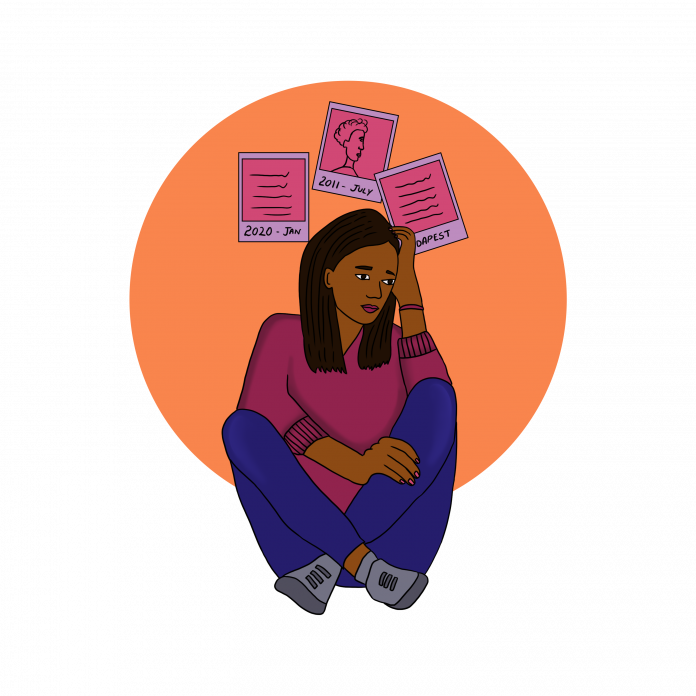By Maryam Ahmad Kiyani
There are 7.9 billion bodies in the world right now. I see that as 7.9 billion archives. To put it simply, our bodies collect and store, and at times– warranted and unwarranted– provide information. During my final year as an undergraduate student of history in Lahore, I did a lot of archival research. I walked the streets of the city in the morning and at night, swept through piles of dusty binders in the city’s oldest libraries, and scanned pages upon pages of magazines from pre-Partition India. What I was doing, really, was seeing what the people and place had gone through to become what it is today– a palimpsest of sorts.
Now, I’m back home in Islamabad, and my therapist, in many ways, is doing the same thing: archival research. She tells me I’m a collection of my past twenty-one years, and that I carry the collection with me, every single goddamn day. Not all archives are easy to carry. Some feel more burdensome than others. They weigh you down, so you pick them up, and you walk– and if you’re born into a slightly more patriarchal family, you run. You keep running. Your life becomes but a series of events of escape. So, what happens when this archive, that is your body, interacts with other bodies? Other archives, essentially.
For some, nothing really happens. It’s normal. It’s not paralyzing. More often than not, men tend to enjoy this luxury; of not having a horrifying archive to carry. However, when female bodies interact with other bodies such as the city, it’s not easy. It’s difficult. It’s triggering. It’s like cautiously treading on a path of thorns, all the while carrying a giant boulder on your back, worried that you may be halted.
As a twenty-two-year-old woman doing digital journalism in Pakistan, when my body interacts with the city, it reacts. Here, it is important for me to mention that all reactions are not explosively reactive. People may not know you reacted. Because in the moment of the interaction, you either shut down, blocked it out, or absorbed it. And what that means, more often than not, is that your archive now weighs heavier than it did before the interaction. So, in many ways, every day that you spend in this country carrying out these interactions, the next day is becoming harder for you.
Let me explain what I mean by interactions. Let me do that by describing a few interactions that I had since I graduated and started working in June of 2021. A week into my job at a digital media platform, I was asked to interview the President of Pakistan. That day, it hit me just how normal it was for spaces to have no women. Throughout the three hours that I was at the Presidential palace, I saw not a single woman. I did see, however, at least 30 men.
And I mean, nothing even happened; the men were nice to me, I wasn’t harassed, I was let to sit in the chair opposite to the President, I was offered tea. It was a good day. Yet, it was a day where I, as a young woman, found herself to be the only woman. And as my team set up the camera and lights, I thought to myself: how have we created spaces that are so exclusive to men? But perhaps more than that, how is this so normal? Why was the other interviewer from a leading think tank in Islamabad, a man in his thirties and not a woman like me? Why did all production teams consist of men only? Why were personal secretaries not women? I want to tell this part of the story because I want to show how this world is not built for women; on both good and bad days. In case you are pitying me, don’t. If you’re a woman reading this, I want to tell you that I understand the experience of aloneness that creeps onto us so often. To live in a world not built for us is to feel like an outsider. To be in a constant search for a home; a place that accepts us for who we are. If you’re a man reading this, I want to tell you that you have it so easy, and it’s not fair, so I hope you’re compensating to your fullest capacity.
Let me also tell you one of the bad days. A day where the walls close down on you more and you feel invisibilized in a country of men. It was 26th July 2021, 6 days after Noor Mukaddam was murdered with a sharp instrument within 10 minutes of distance from the police station in F-7. I was working on a story on gender-based violence in Pakistan. Simultaneously, I was also working on a story on Afghanistan for which I needed to interview a foreign diplomat. So, I Ubered to the Foreign Office where he sat, and mid-interview, I found myself zoning out as I saw Zahir Jaffer’s face play on the television screen behind the diplomat. Jaffer wore a casual black T-shirt, blue jeans, and his hair in a messy bun, and he had no fear in his eyes. That was not the first time I was seeing a man committing a gender-based crime exit a court with no fear, guilt, or shame. There’s been so many.
They kill their wives for something as mundane as the roundness of a gol roti and don’t blink or shed a tear when asked why they did it. They strangle their sisters for the innocent offense of missing the curfew by an hour and appear on camera to say that it was the right thing to do. They abduct and rape their love interests for saying ‘No’ and boast about the crime as evidence of them being “man enough”. They know they’re not the first ones, and won’t be the last ones. That’s what impunity does to criminals. First, I began losing the foreign diplomat’s voice. Then, I felt my vision constrict to become tunnel-like. I could only see Zahir Jaffer’s face. In his face, I saw many more faces. It almost felt like he was around; like he inhabited the space that I sat in. Perhaps, that’s what being a woman is like. To almost always feel like spaces are archives of gendered abuse and violence. Certain spaces like streets, parks, shopping malls, bazaars scream this violence louder than others. Nevertheless, all do scream. But, that doesn’t mean their screams are audible. Who’s hearing?
Days upon days like this, and then one day, you collapse. Of course, you do. But you can’t afford to remain collapsed. So, without reaching out for a helping hand– because you hate having expectations from people– you pick the scattered pieces of your fragmented self and you shove it in the archive. And you carry on. Most times, you do this because you don’t know otherwise. You don’t know what would happen if for once you’d let yourself sink. Or no, maybe you do know– you know you’d sink. So, before you hit rock bottom, you pick yourself. If you’re lucky enough that life doesn’t constrict you to your bad experiences and gives you the choice to be able to have redeemable days, you grasp onto that redemption. Some days later when the sun shines with a little rain and you see leaves grow greener and flowers bloom better, you look back and you feel proud of yourself. You give yourself a hug, a pat. You take an Uber to the nearest flower shop and buy yourself a gajra. The shopkeeper recognizes you. He knows you like your gajra in red roses with a white rose neatly stitched in the center. These days keep you going. In this, you become your best friend. And when you feel this, you feel invincible. Like you know you’ve got your back. You realize your body is learning. By now, it knows this is a cyclic loop of time, and it’s getting in tune. So, you’re able to cope and carry on.
One of the posters that the Digital Rights Foundation published during their call for pitches read that the issue will focus on various forms of violence that women face, both domestic and workplace. In my mind, there’s a great interlink between the two. When violence is inflicted on you in a domestic space, the chaar deewari literally feels like four walls. Walls that are meant to cage you. Draw in on you. Suffocate you. Make you feel like you’re shrinking in size. So, when you leave the domestic sphere and enter the public sphere, which includes the workplace, you carry that shrinking feeling with you. The feeling of not-good-enough.
I don’t want to discount the fact that it’s more likely that you’ll feel new in new spaces. The walls, the air, the lights feel new. Less heavy. You don’t know for a fact if violence has been inflicted in the space these walls enclose. You don’t have a memory to associate with it. As a woman, that usually means you’ll feel less triggered. For example, when I traveled to Tajikistan to cover the SCO summit, I felt free. The space felt different; new, light, accepting. I could just be. My body weighed less heavy. I could carry it without it completely weighing me down. Spaces have the power to make you feel this; triggered or anew. By this logic, when you enter your workspace, it’s a space different from your domestic space, and the walls don’t reek of
trauma. They haven’t absorbed the violence– loud anger, abusive hurls, door slams, emotional blackmail, and panic attacks– the way the walls of your home have. So, your archive feels less triggered. But, because your body– a twenty-two-year-old Pakistani woman’s body– is a heavy archive that is not always deactivated with a spatial change, it treads with care. At some times, defensive and numb. At others, reactive and angry. You wish there weren’t so many triggers, not activated so easily. During a respectful conversation, a male co-worker tells you he’s a feminist but here’s why he thinks the Aurat March does more harm than good, and you’re reminded of all the other times men talked over you to tell you they knew better. Over lunch, you’re having a discussion about the ways we express ourselves, and a male colleague who’s into fashion says that when he’s having a bad day, he dresses up and goes out to meet his friends. You know he’s a good guy. You also don’t want him to not turn his bad days into good ones. Yet, you hated hearing this because you’re reminded of how dressing up as a form of self-expression and going out to meet friends as a form of therapy is a luxury that very few women have. Men, on the contrary, are rarely questioned about where they’re going, with whom, for how long, and why. You begin to feel like the crazy angry feminist. And you wish you could just be.
Not angry. Not triggered. Not exhausted. Just be. In all of this, you’re also reminded of how you have it easier than so many other women. You think you’re privileged. Both in terms of class and religion in this country. Had you been born in a less privileged home with any faith other than Sunni Muslim, or you looked slightly different than the image of an “achi aurat” that the patriarchal structures have created, you’d have it so much worse. You’d be abducted, tortured, and killed in broad daylight, and no one would care. Perhaps this is why Noor Mukaddam’s death shook so many so badly. It challenged certain ideas of safety that women, parents of young girls, and families had told themselves in order to be able to breathe without constant fear of being robbed off of the right to live.
Be grateful, you say to your reflection for not having it worse, and you carry on with your day. How unfortunate and unfair. You want to write about this. You want to speak about this. But, day in and day out, you self-censor yourself. To be a woman in the field of media is to be doubly censored; on a political front yes, but also on a gender front. The power relations embedded in the internet space make you cautious and anxious. You move as much as you can within those structures. In moments and for stories that you’re able to have greater movement, you feel nicer. As your reflection fragments into pixels, you duck down your head and let cold water wash over your face. You then look up, take a deep sigh, and tell yourself you’ll get there. It’s a mix of movement and (im)movement till you get to a life where movement doesn’t come at a price so heavy, feels less fleeting and temporary, and brings you gentleness and joy. For now, a meeting awaits you, so you hold the knob of the bathroom door in your hand, and you unlock it. You step out to carry on.






